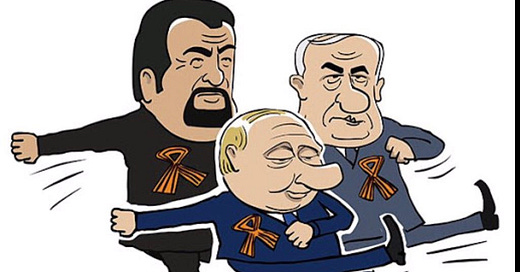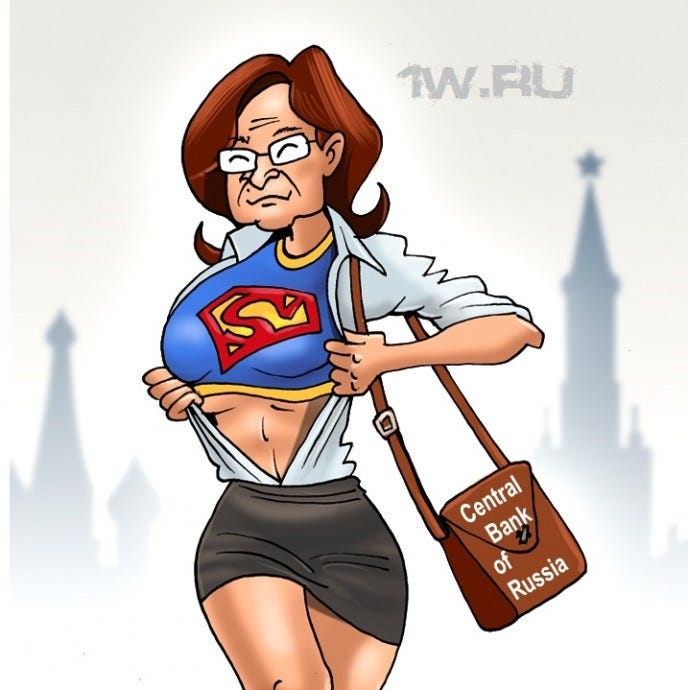April 21, 2022
Declaration of success
The threat of degradation
No constraints
Bureaucrats may be creative
Now it is not scary
Goodbye, but we stay
Putin declares success
Russian Defense Minister Sergei Shoigu reported to Vladimir Putin on Thursday on the Russian army’s first victory in two months of the war in Ukraine—establishing control over the entire city of Mariupol except for the Azovstal iron and steel works.
The armed forces of the Russian Federation and the people’s militia of the Donetsk People’s Republic have liberated Mariupol... Today the entire Mariupol is under the control of the Russian army; the people’s militia of the Donetsk People’s Republic and the territory of the Azovstal with the remaining nationalists and foreign mercenaries is securely blocked.
Shoigu concluded his report by saying that the Russian army was ready to continue its offensive and seize Azovstal.
As for those who hid at Azovstal and are blocked there thoroughly and all around the perimeter, we need about three to four days to complete this work at Azovstal as well.
At this point, Putin unexpectedly proved to be a “dove” by saying:
I do not think the proposed storming of the industrial zone is advisable. I order to cancel... This is a case where we must think—that is, we always have to think, but in this case, all the more about saving the lives and health of our soldiers and officers.
Putin’s words that “we should think about saving lives of soldiers and officers” sounded rather unexpected. The Russian leader had never said this before, avoiding talking about casualties during the war. Apparently, the number of Russian military casualties in Ukraine has become so large that it threatens to grow into a social and political problem for the entire country. This should push the Kremlin to move the armed conflict to a frozen stage, which could be done after announcing a few more victories. Such a victory, for example, could be the withdrawal of the Russian army to the administrative borders of the Luhansk and Donetsk regions. Today, the leader of the LNR announced that LNR armed formations had reached the border with the Kharkiv region.
The target scenario for the Kremlin today, in my opinion, looks like this: The maximum advance of Russian troops in the Donbas and an offer to Kyiv to conclude a truce for negotiations in early May, with the Russian army retaining control over the southern part of left-bank Ukraine (from the Donbas to the Dnieper). Kyiv’s rejection of the truce would lead to continued rocket and bomb attacks on Ukrainian cities while the Russian army refrained from active offensive operations; in turn, the Ukrainian military would not have enough weapons available to dislodge the occupiers, making an armistice inevitable. A hot conflict would turn into a frozen one.
The threat of degradation
Today the State Duma approved Elvira Nabiullina as Chairman of the Bank of Russia for the next five years. Her speech in Parliament was short but contained a very vivid description of the problems to be faced by the Russian economy.
The structural adjustment of the economy... has already begun, and it is [it] that will determine the situation in the economy over the next few quarters. What is the structural adjustment of the economy? The structure of the economy is economic ties, sales markets, the geography of exports and imports, the volume of production, which is determined by external and internal demand, the share of different industries in the economy, the degree of localization of production, the level of involvement in international economic chains and the distribution of the labor force by sector, the demand for specialists in certain specialties, the level of technological sophistication of production processes, and so on. Practically all of this must now change.
Because of sanctions, Russian consumers and manufacturers are losing access to markets for imports and exports of finished products and components. And problems may arise even when production has a high degree of localization when there has already been a relatively high degree of import substitution. For example, if the supply of some components, parts, the share of which in the final product may be small, is disrupted.
...Sewing factories faced difficulties in buying sewing accessories—the leading suppliers were from the European Union. What are they? For example, buttons. Many places make them, but, as the enterprises tell us, according to their estimates, finding new partners and setting up logistics can take up to several months. It is the same, for example, with the paper industry. Our wood is all Russian, but we import bleaching chemicals. Now producers are switching to alternative suppliers and are developing their chemicals. But this also takes time. In the food industry, raw materials are domestic, and the usual foreign packaging must be urgently replaced.
Exporters must look for new logistics: Many ports are closed for Russian ships, and there are restrictions on the work of Russian carriers in the European Union. The problem here may be rooted in Russia’s underdeveloped infrastructure in new directions to increase volumes dramatically. We need to create infrastructure, and we can do it, but it will also take time.
Two days ago, Elvira Nabiullina spoke at a meeting with Vladimir Putin and may have told him the same thing, but judging by his subsequent public remarks, it did not strongly affect him. Therefore, the Russian economy will have to enter the era of “structural adjustment” (to use Elvira Nabiullina’s terminology) or, to put it bluntly, the period of degradation.
No constraints
Speaking in the State Duma, Elvira Nabiullina has confirmed my assessment of the financial limitations of the Russian Ministry of Finance. Or rather, their absence, as far as the short-term perspective is concerned.
Nabiullina said that the Ministry of Finance could sell the liquid assets of the Sovereign Wealth Fund to the Bank of Russia at any time. According to Russian law, liquid assets of the National Wealth Fund (NWF) are kept in accounts in the Bank of Russia, which places them in financial instruments in its name. In addition, the law establishes that the Ministry of Finance has the right to sell and buy foreign currency only by making transactions with the Bank of Russia. If the Ministry of Finance needs to use part of the NWF to finance current expenditures, it will be able to sell foreign currency assets to the Bank of Russia and receive rubles. These transactions will be made within the Bank of Russia, and they are not subject to sanctions restrictions.
Thus, as of March 31, the Russian Ministry of Finance had 19 trillion rubles ($255 bln.) in its current and NWF accounts, which it can dispose of at its discretion. According to the law, all federal budget expenditures this year should amount to 23.7 trillion rubles, of which 6 trillion were financed in the first quarter of this year. Consequently, the Russian Ministry of Finance can theoretically finance all the remaining costs today without waiting for the receipt of taxes.
Bureaucrats may be creative
The Russian authorities continue to look for ways to mitigate the consequences of the financial sanctions and show surprising creativity. For example, Deputy Chairman of the Bank of Russia Yuri Isayev said that the government is consulting with leading exporters to persuade them to engage in import operations.
We need to try to move toward our exporters being also engaged in imports. We are working in this direction, and we believe that this will allow us to balance this imbalance in capital through commodity flows.
Creating such a mechanism would allow Russian companies to pay for imports from accounts opened in foreign banks and thus avoid transferring money to Russia, where it could get stuck in banks hit by sanctions. At first glance, this idea looks fantastic—exporting metal and buying medicine have nothing to do with each other. But if we assume that the state will own the importer of medications and the budget will guarantee exporters all financial risks, then in that case, I am ready to accept that such an idea can be implemented in practice.
Now it is not scary
For the first time, the Bank of Russia has openly stated that it is ready to assist banks that decide to start operating in Crimea. The sanctions imposed in 2014 made it unacceptable for most Russian banks. Still, with new sanctions, those who fell under them had nothing to lose, said Bank of Russia Chairman Elvira Nabiullina.
Several systemically important banks in the new conditions declared their readiness to work in Crimea. Currently, only three banks are registered there, and three more banks are operating in Crimea. <...> The Bank of Russia, on its part, is ready to provide all necessary support, and we have given appropriate instructions to our branches in the Republic of Crimea and the City of Sevastopol.
On April 4, Promsvyazbank, under U.S. and European Union sanctions, said it had begun operations in Crimea. I wouldn’t be surprised if the country’s second-largest bank, VTB, announced the same soon.
Goodbye, but we stay
Carlsberg Group, which announced its departure from Russia on March 28, may sell its most significant asset, Baltika Brewing Company, to AB InBev Efes. AB InBev Efes is a joint venture between the Belgian AB InBev and the Turkish Anadolu Efes, in which each party owns 50%. Still, the Turkish company acts as the managing partner and consolidates the accounts of the joint company and AB InBev shares in the combined company as investments. At the same time, AB InBev directly owns 24% of the shares of the Turkish company.
In 2020, Baltika had about 27% of the Russian beer market, and AB InBev Efes had 30%.
Experts say that Carlsberg has been in talks with various potential buyers, but most have not shown much interest in such a significant asset. At the same time, the Turkish company considers the Russian market to be one of its priorities and is ready to expand its presence there.





